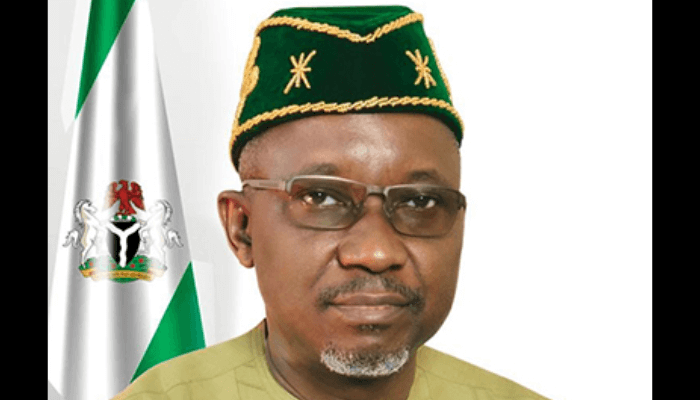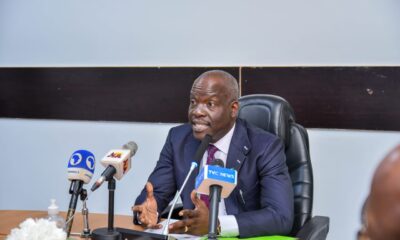Energy
Shell sells off onshore subsidiary to Renaissance consortium
Shell has reached an agreement to sell its Nigerian onshore subsidiary, The Shell Petroleum Development Company of Nigeria Limited (SPDC) to Renaissance consortium.
In a statement on Tuesday, the oil and gas conglomerate said that the completion of the transaction is subject to approvals by the Federal Government of Nigeria and other conditions.
According to Shell, “The transaction has been designed to preserve the full range of SPDC’s operating capabilities following the change of ownership. This includes the technical expertise, management systems and processes that SPDC implements on behalf of all the companies in the SPDC Joint Venture (SPDC JV). SPDC’s staff will continue to be employed by the company as it transitions to new ownership.”
Following completion, Shell will retain a role in supporting the management of SPDC JV facilities that supply a major portion of the feed gas to Nigeria LNG (NLNG), to help Nigeria achieve maximum value from NLNG.
“This agreement marks an important milestone for Shell in Nigeria, aligning with our previously announced intent to exit onshore oil production in the Niger Delta, simplifying our portfolio and focusing future disciplined investment in Nigeria on our Deepwater and Integrated Gas positions,” Shell’s Integrated Gas and Upstream Director, Zoë Yujnovich said.
“It is a significant moment for SPDC, whose people have built it into a high-quality business over many years. Now, after decades as a pioneer in Nigeria’s energy sector, SPDC will move to its next chapter under the ownership of an experienced, ambitious Nigerian-led consortium.
“Shell sees a bright future in Nigeria with a positive investment outlook for its energy sector. We will continue to support the country’s growing energy needs and export ambitions in areas aligned with our strategy.”
The SPDC JV is an unincorporated joint venture comprised of SPDC Ltd (30 percent), the government owned Nigerian National Petroleum Corporation (55 percent), Total Exploration and Production Nigeria Ltd (10 percent) and Nigeria Agip Oil Company Ltd (5 percent).
Renaissance is owned by ND Western Limited, Aradel Energy Limited, the Petrolin Group, FIRST Exploration and Petroleum Development Company Limited and the Waltersmith Group, each with demonstrable and proven operational capabilities
Speaking on the acquisition, Aradel’s Chief Executive Officer/Managing Director, Adegbite Falade commented, “This successful acquisition represents a key step in our journey to becoming a leading energy Company in Africa and aligns with our long-term strategic growth plans. It also demonstrates our commitment to our ‘3R’ Strategy of Resilience, Robustness, and Redundancy.”
Energy
We need consultation, public hearing to review PIA regulations – NMDPRA


The Nigerian Midstream and Downstream Petroleum Regulation Authority (NMDPRA) says consultation with stakeholders and public hearing must be conducted to review proposed draft regulations of the Petroleum Industry Act (PIA).
The Authority’s Chief Executive, NMDPRA, Mr Farouk Ahmed, said this on Tuesday in Abuja at its stakeholder’s forum on Midstream Petroleum Host Community Development Trust (MPHCDT) regulation.
Ahmed, represented by Mr Ogbugo Ukoha, Executive Director, Distribution Systems, Storage and Retailing Infrastructure, NMDPRA, said consultation was necessary to provide a platform for harnessing ideas for the HCDT implementation.
“The regulation shall apply only to the Midstream Petroleum Host Communities and a holder of a license that is engaged in the midstream petroleum operation in accordance with Section 318 of the PIA.
“This is a platform for us to deliberate and get feedback on the draft regulations that we publish,” he said.
In an overview, Dr Joseph Tolorunse, the Authority’s Secretary and Legal Adviser, said the NMDPRA may by notice designate the facilities to which these regulations shall apply in accordance with the PIA.
He listed the objectives of the regulations to include the procedure for the establishment and administration of the Trust Fund for the midstream petroleum host communities and to establish parameters to safeguard the Trust Fund.
According to him, the regulation would also establish grievance resolution mechanism for the settlement of disputes between the host communities and licensees.
“The regulation will make general rules for the implementation of the development of the midstream petroleum host communities. It is expected to promote social and economic benefits from petroleum operations to the host communities.
“It will enhance peaceful and harmonious co-existence between the licensees, lessees and the host communities, as well as curtail pipeline vandalism and increase oil production,” he said.
Also speaking, Chairman, House Committee on Host Communities, Dounamene Dekor, said the committee had carried out a series of engagements to understand the current status of implementation of benefits to host communities.
He urged the Authority to expedite action to apply proactive and innovative mechanisms that would ensure the speedy and effective operationalisation of funding of host communities in the sector.
“We have noted some of the challenges that the authorities face in the implementation of the PIA, particularly the omission of the mainstream petroleum operations in Section 240-2 that provides for the funding of HCPs.
“Our committee is ready and already taking necessary legislative steps to address these gaps and challenges,” he assured.
Energy
Ekpo highlights pivotal role of LPG in industrialisation, job creation


Minister of State Petroleum Resources (Gas), Rt. Hon. Ekperikpe Ekpo, has emphasised the strategic importance of investment in the gas sector, saying it was pivotal for driving industrialization, job creation and improvement of the livelihood of the generality of Nigerians.
The Minister stated this at the groundbreaking ceremony of Windek Energy Limited 20,000 Metric Tonnes (MT) Liquefied Petroleum Gas (LPG) depot project at Atabrikang, Aquaha in Ibeno Local Government Area, Akwa Ibom State at the weekend.
He lauded the vision and commitment of Windek Energy Limited in Nigeria’s journey towards energy security and economic prosperity.
A statement by the Spokesman to the Minister, Louis Ibah, which quoted Ekpo, said the project would boost ongoing efforts in ensuring affordable supply of LPG, commonly known as cooking gas, to Nigerians.
“This project marks a significant milestone in Nigeria’s journey towards energy security and economic prosperity. It will enhance access to clean and affordable cooking fuel,” the Minister said.
Ekpo thanked the Akwa Ibom State government for providing the enabling environment for investments to thrive.
He underscored the fact that the establishment of the LPG depot was a testament to the fruitful collaboration between the public and private sectors in the state.
The Gas Minister said the LPG depot project holds immense promises, not only for Akwa Ibom people, but for the entire nation.
Akwa Ibom State Governor, Pastor Umo Eno, in his speech thanked the Minister of State Petroleum Resources Gas, Ekperikpe Ekpo, for facilitating the establishment of the gas plant in the state.
Eno, represented by the Deputy Governor, Senator Akon Eyakenyi, also assured Ekpo and the management of Windek Energy Limited of the security of contractors and staff, as well as the support and collaboration of the host community in bringing the project to fruition.
MD/CEO, Windek Energy Limited, Mrs. Nosa Okunbor, said the project holds the prospect of stimulating economic growth, fostering innovation, and facilitating the emergence of new industries and value chains within Akwa Ibom State.
“This project is not just about enhancing energy infrastructure, but about enhancing life such that our mothers will cook without hazards to their health,” she said.
Energy
Nigeria to produce 4,000 metric tonnes of lithium per day – Shettima


Nigeria is poised to produce 4,000 tonnes of lithium per day, Vice-President Kashim Shettima, said on Monday in Abuja.
Declaring open a two-day roundtable on Sustainable Development of Nigeria’s Mining Sector, Shettima said President Bola Tinubu would soon inaugurate Nigeria‘s largest lithium factory capable of processing 4,000 metric tonnes of lithium per day.
He noted that the Minister of Solid Minerals Development, Dr Dele Alake performed a ground-breaking ceremony for the Lithium factory in Nasarawa in 2023 to produce 18,000 metric tonnes of lithium per day.
Shettima said that more lithium sites were being discovered across the country.
Lithium is a soft, silvery-white alkali metal. It is the least dense solid element and is a critical solid mineral in the global energy transition.
It is currently mined in Nasarawa, Kogi, Kwara, Ekiti and Cross River states.
The vice-president commended Alake for the reforms he had brought to the solid minerals sector particularly his plan to sanitise and reposition the sector to boost Nigeria’s economic profile.
He also commended the Minister for making the sector public and private sectors-driven, adding that the approach would open up the sector for opportunities and fast-track its development.
Shettima was represented at the roundtable by Nasarawa’s Gov. Abdullahi Sule,
Speaking at the event, Alake said the ministry’s seven-point agenda was in line with President Tinubu’s commitment to diversify Nigeria’s economy.
He said that one of the ministry’s critical seven-point agenda was the emphasis placed on local value addition through policies that promoted the processing of raw minerals because of the economic multiplier effects.
He thanked the National Institute for Policy and Strategic Studies (NIPSS) Kuru, near Jos, for organising the summit.
Alake said the development of the solid minerals sector required collective responsibility by all stakeholders to make it a key contributor to the national economy.
He noted that the roundtable would enrich the analysis of the sector and its recommendations would guide the Executive arm of government in decision-making.
“NIPSS deserves commendation for prioritising the mining sector and in appreciating the strategic value the president placed on diversifying the nation’s economy,” he said.
Alake said also that a dual-pronged approach, combining coercive and persuasive methods, was employed to combat illegal mining and to attract foreign direct investment to the sector.
He explained that the persuasive measure entailed formalising artisanal and illegal miners into cooperatives and that 150 of such cooperatives had been registered so far.
The minister said the coercive method involved the establishment of a Mining Marshal Corps deployed across the country to secure mining environments.
He stressed the importance of geoscience data in providing investors with information on the location and quantity of minerals, among others, to help them to “de-risk” investments.
Alake said that a preliminary survey by a German company revealed an estimated 750 billion dollars’ worth of solid minerals in the belly of Nigeria.
Earlier, the Director-General of NIPSS, Prof. Ayo Omotayo, said the roundtable aimed at charting a way forward to deliver a diversified economy and to formulate policies to advance the mining sector.
NIPPS organised the roundtable in collaboration with a consulting firm.
-
capital market2 years ago
Rt.briscoe, FBNH, Others halts negative performance of stock market
-
Finance3 months ago
Court orders Sen. Victor Umeh to repay N136m bank debt to AMCON
-



 Abuja Update2 months ago
Abuja Update2 months agoUNDP, FG partnership needed to achieve inclusion, equity- Minister
-
Abuja Update1 month ago
Banks drive stock market performance with N147bn gain
-



 Business1 week ago
Business1 week agoTingo Group unveils Tingo Electric, Tingo Cola drink at Lagos launch
-



 Health2 weeks ago
Health2 weeks agoCapacity training will reduce migration of health workers- NPHCDA
-
News4 months ago
Oil thieves sponsoring malicious media campaign against Navy – Spokesman
-



 Infotech1 month ago
Infotech1 month agoWorld Backup Day: NITDA urges Nigerians to ensure backup of data










